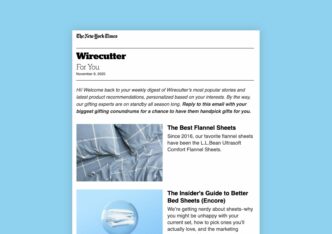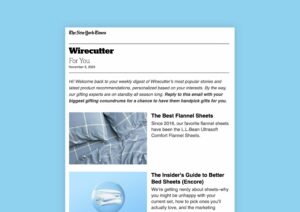

Wrapped up: - Increasing frequency of visits is beneficial to all business models for publishers but, in particular, this metric is directly correlated to user-to-subscriber conversion rates - Your content is of course one of the central ways to achieve this goal, with certain formats such as series proving more valuable to habit formation - UX features and off-site content shouldn’t be forgotten, even small parts of your strategy such as allowing users to save content for later can have a big impact on frequency of visits
Why should you increase frequency of visits?
Specifically, you’re looking to shift focus from eyes on-page, to instead encouraging users to stay on that page, return on a regular basis and consume more content at each visit.
I.e. promote a high level of engagement (recency, frequency and volume of visits).
And, given that engagement directly correlates with conversion rates, efforts on increasing this metric will positively impact your reader revenue.
What’s more, increasing frequency of visits will also support your advertising model, bringing more eyeballs to your site and converting more users into subscribers where ad spaces can be sold at a higher rate.
The goal: Increase frequency of visits to ultimately encourage users to subscribe
The ‘how’: Form habits – something that will drive readers to your site on a regular basis
3 levers to increase frequency of visits:
- Editorial formats
- UX features
- Off-site editorial
1. Editorial formats
Your content – your originality, your relevance to the topic – drives your readers to your website or your app.
As daily newspapers are supposed to be read every day and weekly newspapers every week, updates on each topic and format must be managed well so that contents always remain accessible. Understanding what makes a reader and a future subscriber come back is primordial to win readers’ loyalty.
“We’re a subscription business, so we’ve been looking a lot at binge-watching and creating a body of work that, when people find one, they will spend time with multiple episodes.” – Nancy Donaldson Gauss, NYT’s executive director of video
Series
The Guardian’s “The Secret Teacher” blog series
Les Jours “Episodes”
Crosswords, games, recipes
The New York Times crossword puzzle
Stock markets, live news/updates
CNN stocks and “What’s moving” live feed
Interactive content
Men’s journal’s quiz
💡Added bonus of data collection
2. UX features
Half-way between product and tech, the features you offer readers are crucial to increase engagement and facilitate content consumption.
Follow topics/authors
This is usually a benefit of account creation given that the user needs to receive notifications and have an easily accessible list of authors/topics they’re following.
Financial Times recommends following topics covered in the content
Canadian Globe and Mail’s feature of “Building your personal news feed” by following topics and authors
Save content for later
New Zealand Herald provides a grey button on articles to save content for later.
💡Clicking on the button leads the user to a registration page, offering value (including UX features such as this) in exchange for creating a free account. For publishers, registration not only supports engagement, ad-based revenue and data collection, but can also make a user 10-15x more likely to subscribe in the future.
Discussions/comment sections/debates
South China Morning Post comment sidebar.
Le Drench’s publishing strategy is around debating, publishing two sides of an argument and asking user’s their point of view before and after reading.
💡 This technique takes interaction a step further, actually involving users in the content and discussion
Notifications for new content releases
The Indian Express breaking news alert
3. Off-site editorial
Whilst your website is the centerpiece for your publication, off-site editorial provides additional ways for users to engage with your content, helping to expand your brand and provide additional value to audiences.
What’s more, it will allow you to engage a wider variety of users, all of whom are of course interested in the topics you cover, but may prefer different forms of consuming this content, such as via email, on the app or by following you on social media.
Newsletters
Particularly with an additional value that the user can’t get on your site. For example:
- Exclusive content provided
- Personalized recommendations (“today’s recommendations for you”)
- A different format (“Roundup of the week’s headlines”)
- A unique point of view (“Chief editors take on x topic”)
The New York Times Cooking newsletter offers “What to cook this week”
Importantly, users need control over the newsletters they receive. This personalization will not only help to reduce frustration but also increase engagement by ensuring they receive content adapted to their interests.
Quartz newsletter sign up page
Apps and push notifications
Surprisingly enough, most users don’t feel bothered by push notifications provided that they are:
- directly and measurably helpful for users
- entice readers, making them want to find out more
- Entirely personalizable for readers – i.e. they can configure which notifications they get, when, etc.
BBC News push notifications on mobile
Social media
Instagram has become a source of engagement for many publishers who have made the most of the ‘visual’ nature of this platform to increase frequency of visits.
Tiktok is another platform that’s proven valuable for publishers, especially for engaging younger audiences.












